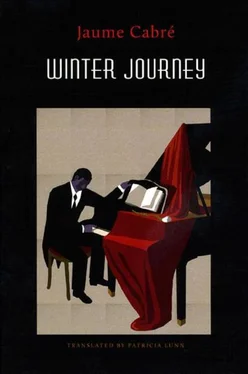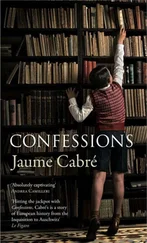 ecause 1 want to see the sunset again from the Sau Valley." "That seems like a stupid kind of reason for risking your life."
ecause 1 want to see the sunset again from the Sau Valley." "That seems like a stupid kind of reason for risking your life."
"When 1 was young, 1 came back from Saxony because 1 was homesick."
"You'll always be a fool."
"Yes. I'll always miss Sau."
The two men were standing under the savage sun, which fell hard on the back of their necks, taking their time to empty the stinking content of their pails, making it look like the shit was sticking, delaying a little longer and keeping their voices low, so no one would imagine they were having a conversation under that cruel sun. Oleguer truly did miss Sau and its imposing landscape. But what really consumed him, and the reason for the whole thing, was finding out why Celia didn't write to him. Twelve years of rats and cockroaches, waiting every day, every minute, every second of his life for a letter that never came.
"You've never seen a sunset in Sau," he replied to Tonet, so as not to have to bring Celia into the conversation.
"1 don't need to. 1 don't want to escape. If they find out, they'll kill you before they ask a single question. 1 don't want to know anything about it. You haven't told me anything." And he turned to leave with his empty but still stinking pail. Oleguer raised his head, discouraged, and saw that mean-faced soldier looking right at him, a sprig of rosemary in his mouth, his eyes bright with hatred of all the pitiful bastards locked up in the prison of the glorious King Ferran.
Six years ago, when planning the first attempt to get out, he hadn't kept anything back and had told his secret to Massip, the one he'd chosen for the escape, who, chewing on a blade of dry grass, had replied, Very nice, but what you should do is forget all about your damn daughter.
"Don't call her damned. I don't know why she doesn't write to me."
"Because she doesn't care a fig about you."
"No: she might be busy. She might've gotten married, maybe she has lots of children and…"
"You're an idiot," Massip had answered. "But I wish 1 had a daughter to miss. And who knew how to write, on top of it. And forget about escaping. I'm afraid to try."
At the time, Oleguer Gaulter had been forced to give up on the idea, because he couldn't carry out his plan alone and he knew that the only person with whom he could do it was Massip, the only prisoner for whom he would put his hand in the fire. The rest of them, if they knew about it in advance, would give away the plot to gain some tiny advantage with the warden. For if those walls had succeeded in anything, it was in degrading everyone inside to the point of taking away their sense of shame.
How things change: seven months later, Massip begged him to explain the escape plan, because of an emergency. They could talk in the yard then, in the morning, because the warden at the time had granted them a longer break, despite the unspoken indignation of the sullen jailers and the soldiers in the garrison.
"You'll have to climb out in the dark. It's the same plan."
"I don't care. That's great."
For three nights, behind the backs of their cellmates, they made sure that more or less at midnight, at the changing of the guard, everyone in the prison was asleep and they could help one another climb onto the roof, using the rope he'd braided with infinite patience out of hope and straw. From there, if they weren't afraid of the fall, the height of two tall men, they could get away across the fields, even if one of them broke a leg, and try to endure the pain until they got to the forest where, unless they were hunted with dogs, they could consider themselves almost safe. Massip, who seven months before had turned up his nose because the plan left too much to chance, had to admit that it was the only way possible. Three days earlier, they'd taken him to the warden's office and read him the official decree. Then he'd gotten the trots and gone running to Oleguer to ask, Hey, friend, what about that plan of yours?
"You'll have to climb out in the dark. It's the same plan."
"1 don't care. That's great," Massip had said. "I'll escape with you. And let's do it right away," he added. Oleguer decided it would be the first time when the midnight moon didn't turn the night yellow. Five days, Massip. But everything came to an end because, incomprehensibly, they put the date of the execution forward, and Oleguer's plan and Massip's life were both destroyed. The wretch had taken Oleguer's secret with him to the miserable tomb of the prisoners of the mad king Ferran, the sixth of that name, of the Bourbon line.
And so, and in memory of poor Massip, he'd spoken of the sunset in Sau only to Tonet. Tonet, the shit bucket in his hand, had looked at him askance and moved away. Oleguer, thinking about all of this, stopped leaning against the wall of the yard and went towards the setting sun, where there were no other prisoners to call him crazy. He trusted no one, but if in the end he'd chosen Tonet, it would be Tonet, who was as small and as slight as Massip. He spent the time that hung heavy on his hands thinking of Celia, of those who'd died, of Master Nicolau, of the landscape of Austria and of Saxony, as different as their language, which he'd come to master after the six or seven years he spent there. And when he tired of reviewing his memories, he spent his time perfecting the escape plan he'd explained to Massip. He knew that after midnight, when the watch changed, most of the sentries took the opportunity to get some sleep, because nothing ever happened in the prison and it was so dark that it was impossible to take a step without falling into one of the holes or poorly covered drains in the yard. What the jailers didn't know was that, after twelve years, Oleguer's eyes, besides getting paler-more from hopelessness than from the darkness-had adjusted to seeing in the dark, like cats' eyes. Another thing they didn't know was that, instead of the predictable route through the yard, he planned to go over the roof, where it was impossible to take a step at night without risking your neck. And why doesn't she write to me one single time? Just once?… He'd sent her seven letters during the first seven months. A comment from the previous warden to the effect that she didn't seem to want to answer made him stop writing for a time. For fear of seeming pathetic? No: so as not to annoy her. But a few months later he went back to writing brief, imploring notes, in which he said, Celia, my daughter, just let me know you're alive, that you're well, that you've married, that you have children, that you remember me. Just a sheet of paper saying, Hello, Father. 1 don't ask for anything else. Hello, Father; it's what 1 most want in the world, Celia.
Then they changed the warden and put in that bastard Rodenes, who called himself baron without being one and who enjoyed watching the bodies of his herd grow thin because of the villainy for which they'd been imprisoned. No more walking in the yard and a return to the convent rule of perpetual silence, too much squawking. Then they even forbade writing, or do you think we should burden the royal mail with your drivel? You shouldn't have committed a crime in the first place. And six years went by like that, or maybe seven, waiting every day for Celia's letter. For that reason, and not because he missed the sunsets in Sau, which he could hardly remember, he'd decided to escape from His Majesty's prison.
When he was seven years old, his father, who had moved from Sau to Barcelona, apprenticed him to the workshop of Nicolau Saltor, the master organ builder. Had his father known that, by putting him in contact with Master Saltor, he was condemning his son to a life sentence at the age of forty and to dying, rotten inside and out, locked up in the most squalid penitentiary in the country, he would surely have taken him back. But that's the thing about destiny: it reveals not the whole story, but only the little piece it chooses, and then it misleads you with an ambiguous snicker.
Читать дальше

 ecause 1 want to see the sunset again from the Sau Valley." "That seems like a stupid kind of reason for risking your life."
ecause 1 want to see the sunset again from the Sau Valley." "That seems like a stupid kind of reason for risking your life."










